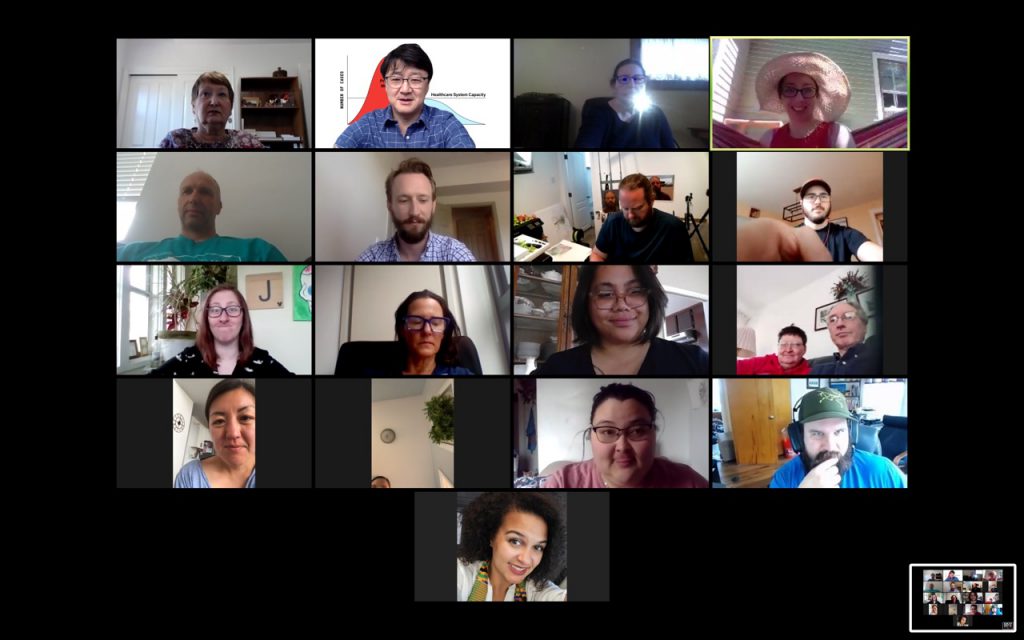
Brown Bag Forum: The New Lunchtime Conversation During COVID-19

Professor Han Kim connects public health experts with the Westminster community through the Brown Bag forum
by Liz Dobbins (’21)
In the not-so-distant past, Friday lunch breaks often consisted of sandwich runs with coworkers, sipping on iced coffee, and preparing for the last four hours of work that separate you from the weekend. For many, that all changed since the emergence of the coronavirus. In response to the global pandemic we are facing, Westminster public health and Honors professor, Han Kim, created a new way to experience Friday lunches: a virtual brown bag series that invites participants to discuss anything and everything related to COVID-19.
Han received his doctorate in epidemiology—a subset of public health that analyzes the distributions of diseases in populations—and has been in the public health industry for many years. In creating the virtual brown bag series, he wanted to provide access for those who may not know the difference between a virus and bacteria—or what COVID stands for—to public health experts. Han created a space for participants to ask the experts questions and educate themselves on this historic event.
“It's a great opportunity to dispel some of these misconceptions that people have, talk about politicization of COVID in a relatively safe environment, and discuss topics that you may not be able to get in depth if you're just reading the Trib, KSL, or CNN,” Han says. The virtual element of the brown bag series has allowed for perspectives from around the world, providing opportunity for Han to invite guest panelists that speak to different aspects of the pandemic. “A friend of mine from Kyrgyzstan—he advised some of the disaster-prep folks there—talked about the approaches that they've taken,” Han says. “I had a student who has recovered from COVID talk about his experience. Joyce Gaufin who was the president of the American Public Health Association and has been in public health for 40 years has been able to chimein.”
Han reminds us that during a pandemic like this, you aren’t just looking through one lens. Medical and biological standpoints need to be addressed, but the issue also reaches into the social, political, economic, and cultural lenses. That’s where public health comes into play. Typically, public health professionals are overlooked. Their field lacks funding, their predictions are highly criticized, and the public as a whole isn’t entirely aware of their impact.
“Public health has always been short-changed,” Han says. “One of the frustrations with public health is that if we do our job, nothing happens. Everything's status quo, but people don't realize that public health has been working behind the scenes. We don't get those headlines.”
The flip side—and one area of large debate currently—is if public health professionals do their job and set predictions such as the death rate of this pandemic, and the numbers are less than they predicted, everyone points fingers at the professionals. “If we do our job, we'll be accused of overreacting—and it's already happened,” Han says. “We're already seeing our curves flattening. The number of deaths isn't reaching the estimate Dr. Anthony Fauci mentioned, and people are already saying we killed the economy for nothing.”
However, the coronavirus isn't just highlighting public health professionals, it is also putting a spotlight on social issues—specifically in the US. “It's impacting a lot of assumptions that we have,” Han says. “A lot of the basic tenants of our political, social, and economic structures are now being questioned because of this. It is of course a tragic time period. It's something that I wish didn't happen, but it is happening and we can actually look at it as an opportunity to make some basic changes to our structures to alleviate some of these social justice issues.”
The Brown Bag forum examines these issues related to COVID-19 and works toward solving the problems through open discussion. “I'm hoping that's the direction our future conversations take,” Han says. “'Okay, so this is happening. What is this saying about some of the weaknesses of our political social structures? Can we do something to strengthen those?’”
Han says it is times like this when a Westminster education shines. The multidisciplinary approach enhances critical-thinking skills, and our students and alumni are making the difference now. “We think of it as a medical-health-related issue,” he says. “It's not. It touches on social and economic issues. It touches on history, philosophy, biology, and sociology. Westminster folks with this broad liberal arts education are especially well-suited to really understand and analyze the deeper issues that COVID brings up.”
Han invites the Westminster community to the forum to increase the level of discussions and help further the multidisciplinary education, even as an alumni. But he does ask for one thing: “I would strongly suggest coming in with a very open mind without a set agenda. Be prepared to listen to different perspectives.”
When: Friday, noon
Meeting ID: 355 868 797
Password: 546060
About the Westminster Review
The Westminster Review is Westminster University’s bi-annual alumni magazine that is distributed to alumni and community members. Each issue aims to keep alumni updated on campus current events and highlights the accomplishments of current students, professors, and Westminster alum.
GET THE REVIEW IN PRINT Share Your Story Idea READ MORE WESTMINSTER STORIES